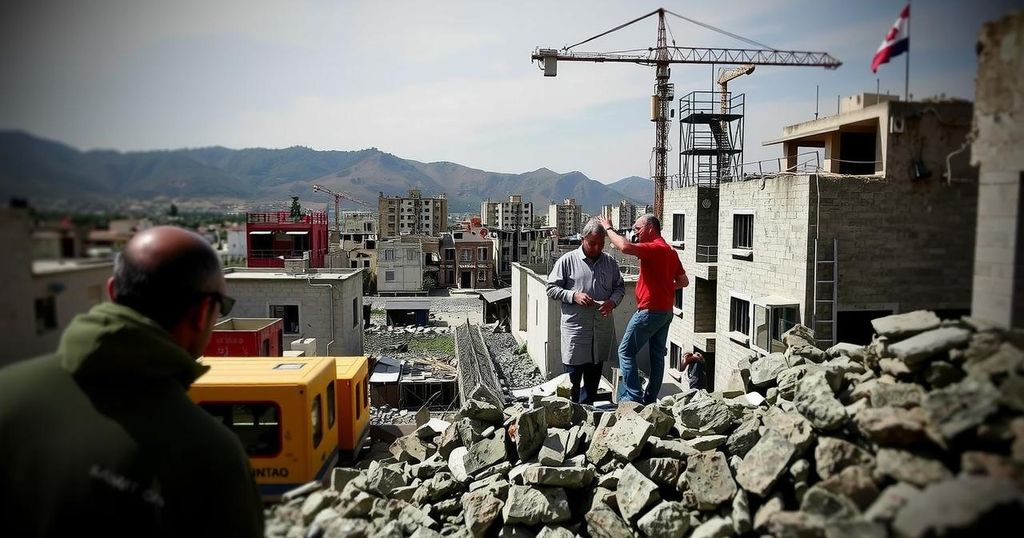Iraq Commits to Supporting Lebanon and Gaza Reconstruction Efforts

Iraq has pledged to assist in the reconstruction of Lebanon and Gaza following a ceasefire brokered with Hezbollah. Government spokesman Basim al-Awadi highlighted Iraq’s critical mediating role, assuring ongoing support and addressing public concerns over voluntary salary deductions for funding. Additionally, proactive measures against potential Israeli threats have been outlined, with Iraq seeking a stronger position in regional diplomacy.
Iraq has pledged significant support for the reconstruction efforts in Lebanon and Gaza following the recent ceasefire between Israel and Hezbollah. Government spokesperson Basim al-Awadi emphasized Iraq’s vital role in mediating the ceasefire, characterizing it as a crucial measure to prevent further conflict in the region. During a statement on Iraqi state television, al-Awadi expressed, “The ceasefire in Lebanon is an important step that has steered us away from a full-scale war. It will also serve as a foundation for a ceasefire in Gaza.”
He reiterated Iraq’s commitment to assisting these regions until stability is attained, stating, “We will continue assisting in Gaza and Lebanon until stability is achieved. Iraq will also contribute to the reconstruction of both regions.” Responding to public discontent regarding a proposed voluntary deduction of 1% from public employees’ salaries for this purpose, al-Awadi clarified the initiative’s nature. “This deduction is not mandatory but entirely optional,” he stated, reassuring that employee salaries are constitutionally protected and addressing claims of media opposition against the government’s decision.
Amidst concerns over potential threats from Israel, al-Awadi described the measures the government is preparing to enhance national security. He stated, “The National Security Council has developed security and military strategies to counter any threats,” ensuring that Iraq would take legislative and military actions to safeguard its sovereignty. Al-Awadi acknowledged Iraq’s instrumental role in mediating the ceasefire agreement, remarking on its effective coordination between involved nations.
Additionally, Iraqi Prime Minister Mohammed Shia’ al-Sudani proposed the establishment of an Arab-Islamic reconstruction fund during a joint summit, encouraging all countries to participate. This reflects Iraq’s commitment, as he expressed, “Iraq’s commitment to aiding Palestine and Lebanon reflects our belief in humanitarian responsibility.” Furthermore, al-Awadi addressed Iraq’s evolving relationship with the United States, indicating that future affairs will prioritize Iraq’s national interests amid discussions of concluding the international coalition’s mission in Iraq.
The government’s attempts to support Lebanon and Gaza, along with maintaining Iraq’s sovereignty, denote its aspirations to enhance its role in regional diplomacy and humanitarian assistance. Nevertheless, this initiative faces criticism regarding the legal implications of the proposed salary deductions for public sector employees. In a recent parliamentary session, a lawmaker brought forth concerns, urging the Iraqi government to reconsider this decision.
Iraq has publicly committed to supporting reconstruction efforts in Lebanon and Gaza following a recent ceasefire agreement brokered between Hezbollah and Israel. This move reflects Iraq’s broader ambition to play a constructive role in regional affairs, particularly concerning humanitarian issues and stability in neighboring countries. The Iraqi government emphasizes its pivotal role in mediating disputes and facilitating dialogue among regional actors. Meanwhile, there have been concerns voiced by citizens regarding the legality and ethical implications of financial proposals aimed at supporting these efforts.
In summary, Iraq has pledged extensive support for the reconstruction of Lebanon and Gaza following a key ceasefire, underscoring its commitment to regional stability and humanitarian assistance. However, this initiative, while well-intentioned, faces scrutiny regarding financial contributions from public employees, thereby highlighting the need to address domestic concerns alongside international responsibilities. Iraq’s approach aims to bolster its diplomatic role while balancing its national interests as it engages with both regional neighbors and global partners.
Original Source: www.newarab.com








